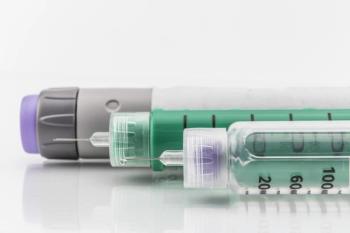
Diabetes
Latest News

Latest Videos

CME Content
More News

Recently, it has been shown that the mechanism by which glucose is managed can have a substantial impact on cardiovascular outcomes. For this reason, along with increasing prevalence of type 2 diabetes (T2D), effective, patient-centered management of coronary artery disease (CAD) in patients with diabetes is imperative to optimize patient outcomes, the American Heart Association said.

Women born by cesarean section were 11% more likely to be obese and had a 46% higher chance of developing type 2 diabetes (T2D) compared with women born by vaginal delivery, according to a study published in JAMA Network Open.

Coverage of our peer-reviewed research and news reporting in the healthcare and mainstream press.

Centivo has launched a new health plan solution, aimed at lowering costs for employees; trial results show dead bacteria may be effective in treating IBS; continuous glucose monitoring systems are now being used in hospitalized patients with diabetes and coronavirus disease 2019 (COVID-19).

Good dental hygiene is associated with a decreased risk of developing diabetes, according to study results published in Diabetologia, the journal of the European Association for the Study of Diabetes.

Researchers created a machine-learning–based model to help predict which patients will develop diabetes, according to an abstract to be published in the Journal of the Endocrine Society.

This week, the top managed care news includes a CDC report says diabetes is the condition most linked with coronavirus disease 2019, CMS temporarily suspends rules to give hospitals more capacity during the COVID-19 pandemic, and a late-stage trial for dapagliflozin ends early after showing efficacy for chronic kidney disease.

Vitamin D deficiency in women with gestational diabetes mellitus (GDM) is associated with an elevated risk of postpartum glucose intolerance, according to a study published in Endocrinology and Metabolism.

In the United States, diabetes mellitus is the most frequently reported condition among the 7162 coronavirus disease 2019 (COVID-19) cases for whom comorbidity data is available, according to new CDC information.

Elevated glucose levels are common in solid-organ transplant recipients and associated with short- and long-term mortality risks in hospitalized transplant recipients. This increased mortality risk was independent of age, gender, smoking, alcohol, or comorbidities.

According to the CDC, individuals with diabetes may experience more serious complications from the novel coronavirus (COVID-19) than the general population.

Researchers found that 1 in 10 patients with diabetes initially hospitalized for treatment of common medical conditions was discharged with intensified diabetes medications, with nearly half unlikely to benefit due to limited life expectancy or already having an optimal blood glucose level.

Diabetes pay-for-performance programs may reduce all-cause mortality in patients with type 2 diabetes (T2D).

Coverage of our peer-reviewed research and news reporting in the healthcare and mainstream press.

Exposure to air pollutants alters the composition of gut microbiota, which increases the risk of obesity, diabetes, gastrointestinal disorders, and other chronic illnesses, according to a study published in Environment International.

Michael D. Abramoff, MD, PhD, is the Robert C. Watzke, MD Professor of ophthalmology and visual sciences at the University of Iowa Carver College of Medicine. He is also a professor of electrical and computer engineering and a professor of biomedical engineering at the University of Iowa. Abramoff’s research interests include how autonomous artificial intelligence (AI) can be used to improve the lives of patients, with a focus on autonomous AI-based diagnostic and quantification algorithms for retinal disease. He is the founder and executive chairman of IDx Technologies, which developed IDx-DR, an FDA-authorized autonomous AI diagnostic system for the detection of diabetic retinopathy and macular edema. An editor from The American Journal of Managed Care® recently conducted a question-and-answer session with Abramoff regarding the use of AI in the diagnosis of diabetic retinopathy.


The FDA granted a fast track designation to Jardiance (empagliflozin) for treatment of chronic kidney disease; a new review in the New England Journal of Medicine urges physicians to prepare for self-managed abortion complications; Alcoholics Anonymous is more effective than other common abstinence treatments.

From funding innovative research to advocating for government action to providing a support structure for our community, no other organization does more to fight type 1 diabetes (T1D) than JDRF.

Today CMS announced the Part D Senior Savings Model, allowing Medicare Part D prescription drug plans to offer plan choices that provide a range of insulins to beneficiaries, at a maximum $35 copay per 30-day supply throughout the benefit year.

This study assesses the cost-effectiveness of adding a sodium-glucose cotransporter 2 inhibitor versus switching to a glucagon-like peptide-1 receptor agonist in patients with diabetes on metformin and a dipeptidyl peptidase-4 inhibitor.

The FDA announced a new draft guidance to consider broader evaluations beyond cardiovascular outcomes trials for type 2 diabetes (T2D) medications.

The American Diabetes Association (ADA) recently created a new part of its website, the Engagement Platform, designed to track legislation of interest to consumers.

Coverage of our peer-reviewed research and news reporting in the healthcare and mainstream press.

We examine the effects of MD–Value in Prevention (MDVIP) enrollment on Medicare expenditures and utilization among fee-for-service beneficiaries with diabetes over a 5-year period.















